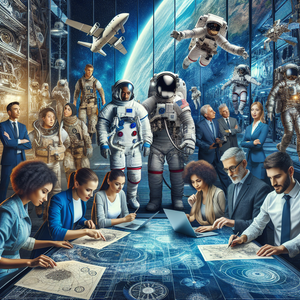
Diverse Careers in Space Exploration: From Engineers to Astronauts
The journey to becoming an astronaut is as varied and expansive as the universe itself. While astronauts are often seen as the face of space missions, a vast array of professionals—engineers, scientists, technicians, and more—play crucial roles in space exploration. Aspiring astronauts typically need advanced degrees in STEM fields, but many career paths contribute to space missions. These range from military pilots and research scientists to avionics technicians and GIS analysts. This article highlights the diverse opportunities available in the space industry, inspiring those passionate about space to explore various paths that advance humanity's exploration of the universe.
Job Summaries:
Aerospace Engineer:
- Aerospace engineers are essential for designing and testing spacecraft, developing structural components and propulsion systems.
- They typically hold a bachelor's degree in aerospace engineering, requiring proficiency in CAD software and a strong physics and mathematics foundation.
- Their work ensures spacecraft safety and mission success.
Avionics Technician:
- Specializing in electronic systems for spacecraft, avionics technicians troubleshoot communication, navigation, and flight control systems.
- An associate degree and certifications from aviation authorities are typical requirements.
- They are vital for the reliability of equipment astronauts depend on.
Plasma Physicist:
- By studying plasma properties, plasma physicists advance propulsion systems and energy sources for spacecraft.
- A doctoral degree in physics, focusing on plasma studies, is essential.
- Their research supports sustainable and efficient space missions.
Mission Specialist:
- As astronauts responsible for specific mission tasks, mission specialists conduct experiments and operate robotic arms.
- Advanced STEM degrees and expertise in their field are necessary.
- They ensure mission objectives are met, contributing to scientific success in space.
Pilot Astronaut:
- Commanding and piloting spacecraft
- Manage crew safety
- Execute missions
- Background as a military or commercial pilot required
- Engineering degree often required
- Aviation expertise is crucial for mission safety
Spacecraft Systems Engineer:
- These engineers ensure various spacecraft subsystems function seamlessly together.
- A bachelor's degree in systems or aerospace engineering, with project management experience, is typical.
- They play a key role in mission readiness and success.
Space Medicine Specialist:
- Focusing on astronaut health, these specialists research space travel's effects on the human body and develop medical protocols.
- A medical degree and aerospace medicine expertise are vital for addressing space travel's medical challenges.
Satellite Communications Engineer:
- Designing and maintaining satellite systems, these engineers ensure data transmission reliability between spacecraft and ground stations.
- A degree in electrical engineering or telecommunications is required.
- They enable essential communication for mission control.
Astrophysicist:
- Studying celestial phenomena, astrophysicists provide insights for space exploration strategies.
- A Ph.D. in astrophysics is typically needed.
- Their research informs mission planning and scientific objectives.
Robotics Engineer:
- Designing robots for space exploration
- Robotics engineers are crucial for tasks performed remotely or in hazardous environments
- A bachelor's degree in robotics or mechanical engineering is necessary
- Emphasizing programming skills
Space Policy Analyst:
- Evaluating policies related to space exploration, these analysts advise government agencies.
- A degree in political science or public policy is typical.
- They influence space exploration strategies and regulatory compliance.
Data Scientist in Space Exploration:
- Analyzing datasets from space missions
- Supporting decision-making processes
- Contributing to scientific research
- Background in data or computer science required
- Skills in programming and data analysis
Environmental Scientist for Space Missions:
- Studying the environmental impact of space missions, these scientists develop strategies to minimize ecological footprints.
- A degree in environmental science is required, focusing on sustainability practices.
Astrobiologist:
- Researching life's potential beyond Earth
- Study extreme environments
- Develop life detection methods
- A doctoral degree in biology or related fields is essential
- Their work shapes the search for extraterrestrial life
GIS Analyst in Space Exploration:
- Using geographic information systems to analyze spatial data
- GIS analysts support mission mapping and navigation
- A degree in geography or GIS is required
- Proficiency in GIS software is required
By providing comprehensive insights into these roles, this article equips readers with valuable information about career paths in space exploration, catering to diverse interests and expertise.
Explore More Jobs

